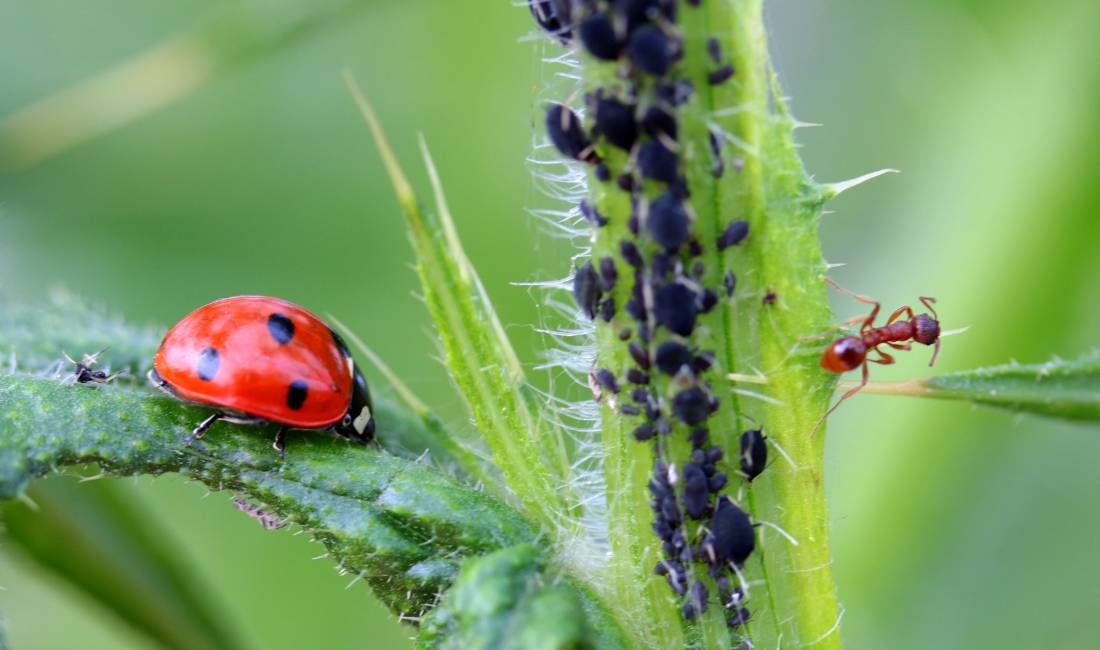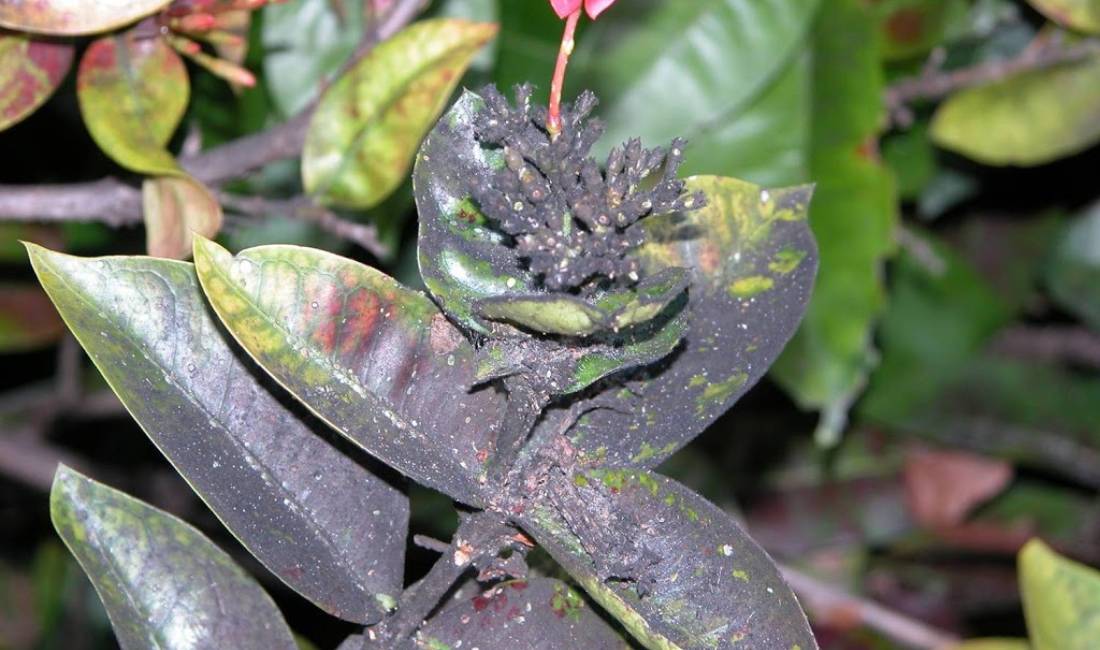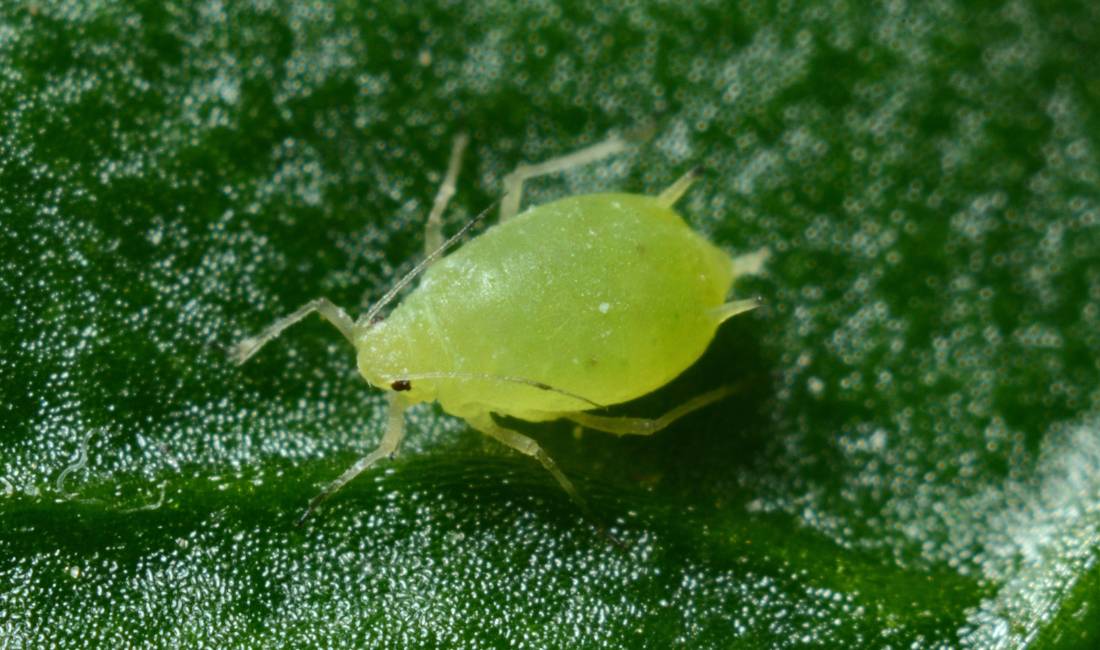Have you noticed an outbreak of tiny little insect pests on your Palm Beach Island estate plants? Have you also seen a dark brown to black growth on your plants’ stems that seems to be attracting ants, wasps, and other pests? If you answered yes, it’s likely you’re dealing with an aphid infestation! So let’s talk about aphid control.
Though the term “infestation” can sound scary, don’t panic. Aphids and the effects they have on your South Florida plants can be controlled if you know how to approach the problem. In this article, we’ll explore how aphids and the sooty mold they invite can impact your estate plants, and we’ll provide you with practical solutions to keep them under control.
This article will explore the following topics regarding aphid control on Palm Beach Island:
- Identifying Aphid Infestations on Your Palm Beach Estate
- Understanding the Impact of Honeydew and Sooty Mold
- Controlling Aphid Infestations
- Implementing Effective Preventative Pest Management Strategies
Aphid Infestations on Your Palm Beach Island Estate – Key Takeaways
- Aphids can cause significant damage to plants by transmitting diseases and weakening plant health.
- The presence of honeydew, a sticky waste product produced by aphids, can lead to the growth of sooty mold, which affects plant appearance and vitality.
- Aphids can be controlled by physically removing them with a strong blast of water, introducing natural predators like ladybugs or lacewings, using insecticidal soaps and oils, and considering chemical insecticides as a last resort.
- Implementing natural remedies and practices such as using homemade sprays, attracting beneficial insects, regularly inspecting plants, and practicing good garden hygiene can help prevent and control aphid infestations.
- Chemical control of aphids is an option but should be applied by professionals to ensure safety and effectiveness
- Hiring a professional estate landscape service can help monitor, prevent, and control pest infestations on your Palm Beach estate.

Aphid infestation attracts predators like the ladybug as well as secondary pests such as ants that feed on the honeydew the aphids secrete.
Identifying Aphid Infestations
You’ll need to look for small, soft-bodied insects on your plants to determine if you have an aphid infestation. Aphids are tiny pests that can wreak havoc on your Palm Beach Island estate plants. They are usually green or brown in color and can be found congregating on the leaves, stems, and buds of your plants. These pests have a piercing-sucking mouthpart that they use to feed on the sap of your plants, causing stunted growth, yellowing leaves, and distorted flowers.
Another telltale sign of an aphid infestation is the presence of a sticky substance called honeydew, which is actually the aphids’ waste product. This sticky residue can attract ants and wasps while promoting the growth of sooty mold. This resulting fungal condition can further damage your plants’ health and aesthetics.

Left untreated, sooty mold has a devastating effect on plant aesthetics and health on Palm Beach Island.
Understanding the Impact of Honeydew and Sooty Mold on Plants
Don’t ignore the effects of honeydew on plants. Here are three reasons why honeydew should be a cause for concern:
- Unsightly Appearance: Honeydew creates a shiny, sticky film on the leaves and stems of your plants, making them look dirty and unattractive. This can detract from the overall beauty of your estate and diminish the appeal of your outdoor spaces.
- Fungal Growth: Honeydew serves as an ideal breeding ground for sooty mold, a black, powdery fungus that thrives on sugary substances. Sooty mold not only further compromises the appearance of your plants but also interferes with their ability to photosynthesize, leading to stunted growth and reduced vitality.
- Attracting Pests: The sweet aroma of honeydew acts as a beacon for other pests, such as ants and wasps. These insects are attracted to the sweet honeydew and can further harm your plants or even infest your property.
To protect your Palm Beach Island estate plants from the detrimental impact of honeydew and sooty mold, it is essential to control aphid populations and remove the sticky residue promptly.
Natural and Chemical Remedies for Aphid Control
Using natural remedies is an effective way to manage and prevent aphid infestations. To control aphids on your Palm Beach Island estate plants, there are several methods you can try, including:
- Mechanical Control of Aphid Infestations
- Predatory Insects to Control Aphids
- Natural/Soft Pesticide Products
- Chemical Control of Aphids
1. Mechanical Control of Aphid Infestations
One natural remedy for aphid control is using a strong stream of water to dislodge them from your plants. Simply spray your plants with a hose, focusing on the affected areas. This will help to remove the aphids and prevent them from causing further damage.
2. Predatory Insects for Aphid Control
Another option is to introduce natural predators to your garden. Ladybugs, lacewings, and parasitic wasps are all-natural enemies of aphids. You can attract these beneficial insects by planting flowers such as daisies, marigolds, and yarrows, which they are attracted to.
3. Natural Pest Control Products
Additionally, you can make your own homemade aphid spray using ingredients you may already have in your kitchen. Mix a few drops of dish soap with water in a spray bottle and apply it to your plants. The soap will suffocate the aphids and prevent them from reproducing.
4. Chemical Aphid Control
There are natural and synthetic pesticide products that are effective in combatting aphids. When using chemical controls, it’s wise to use a professional landscape and pest control service to ensure the products used are appropriate and that they’re applied effectively and safely.
Take proactive measures to protect your plants and maintain the beauty of your estate.
Implementing Effective Pest Prevention Strategies
To effectively manage pests on your Palm Beach Island estate, it’s important to implement strategies that target the root cause of the infestation by focusing on prevention. Implementing effective pest monitoring and environmental control strategies will not only help control aphids and their honeydew but also ensure the overall health and vitality of your plants.
Regular inspection of your plants is crucial. By closely monitoring for any signs of aphid infestation, such as distorted leaves or sticky honeydew residue, you can catch the problem early and take immediate action. Additionally, removing any heavily infested plant parts or whole plants can prevent the spread of aphids to other areas.
Additionally, practicing good garden hygiene is essential. Regularly cleaning up fallen leaves and debris, as well as removing weeds, can eliminate potential hiding places and breeding grounds for aphids.
By implementing these preventative strategies, you can effectively manage pests on your Palm Beach Island estate, ensuring the health and beauty of your plants for years to come.
Aphid Control FAQs
What time of year are aphids a problem?
Springtime. Check your plants regularly for aphids—at least twice a week when plants are growing rapidly—in order to catch infestations early so you can knock or hose them off or prune them out. Many species of aphids cause the greatest damage in late spring when temperatures are warm but not hot 65°F-80°F (18°C-27°C).
Why do I suddenly have aphids?
One reason could be the excessive use of nitrogen-rich fertilizer, which encourages too much tender, leafy plant growth. Transplanting shock stresses plants vulnerable for a few days to a week. A temporary springtime population explosion of aphids prior to the emergence of their natural predator insects such as ladybugs.
Why are aphids worse in some years and not in others?
There is no clear answer. Sometimes, insects appear in cycles. The mild weather with two cold snaps during the winter of 2022–2023 impacted plants, pests, and predatory insects. In the case of aphids, it may be a combination of the spring drought and our gardening routines.
Will Aphids go away on their own?
Aphids feed on the sweet, nutrient-rich liquids that run through plant veins, eventually causing them to wither and die. And the problem doesn’t go away on its own—Aphids can multiply into several generations over the course of one growing season, resulting in catastrophic destruction to your garden.

The benign-looking aphid is a tiny insect pest that does damage in high numbers.
A Final Thought Regarding Aphid Control
Now that you know how aphids and their honeydew can wreak havoc on your Palm Beach Island estate plants, it’s time to take action.
Don’t let these pesky pests destroy your beautiful garden any longer. With the help of natural remedies and effective pest management strategies, you can regain control over your plants and protect them from further harm.
So, gear up and get ready to fight back against aphids. Your plants are counting on you!
Are Aphids Overtaking the Plants on Your Palm Beach Island Estate?
Whether it’s aphids or another pest issue, call Coastal Gardens at 561-308-7604 for prompt, effective service. We’re your Plam Beach Island pest control experts with the experience, skill, and in-depth knowledge to handle any pest or disease issue your South Florida plants are facing. Let us protect your estate and keep your property healthy and looking beautiful.
CALL US TODAY At 561-308-7604
Estate landscape Services
For Fine Properties in Palm Beach
With Coastal Gardens, you can rest easy knowing that your property is taken care of by a dedicated team of estate landscape professionals who truly care about creating and maintaining a dazzling outdoor space you can be proud of.
